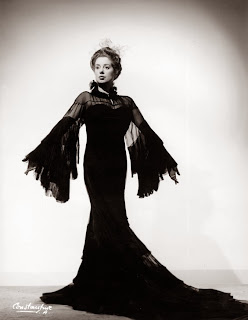 |
| My grandmother bore a resemblance to the star of this week's Dance Party; that may be why I have always been fascinated by her. |
 |
| The Bride of Frankenstein is always resurrected during the Halloween season, and Elsa Lanchester reappears in the title role. The film itself is a classic, and many critics believe it to be one of those unusual sequels which is superior to the original which inspired it. Much of the plot of the film is included in Mary Shelley's original novel Frankenstein, and in fact, Lanchester plays a duel role, that of the man-made wife and of Mary Shelley herself, who appears in a prologue reminding viewers where the first film left off. Haven't had enough of Frankenstein yet? I wrote more on the subject in a previous Dance Party, go here for that report. |
 |
| Elsa's glamour period was relatively short. Her many middle-aged character roles are the ones which first caught my attention as a kid. |
I confess to never having seen Bride of Frankenstein, as I am not a fan of the horror film. But I am indeed a fan of Elsa Lanchester's. She had an extremely long career in film and on stage, but was consistently remembered primarily as the wife of Charles Laughton.
Laughton predeceased his wife by many decades, and it was in her later career that she caught my youthful attention. I have always had an artistic attraction to middle-aged character actresses such as Lanchester, Hermione Gingold, the Baddeley Sisters (Angela of Upstairs / Downstairs fame, and Hermione of Maude) and other quirky gals.
Elsa was born of socialist parents who never married, quite the scandal in the early part of the 20th century, and our heroine was treated to an eccentric childhood, to say the least.
 |
| Elsa displayed both comedic and villainous chops in The Inspector General, opposite Danny Kaye. |
She studied dance with Isadore Duncan, whom she detested, and was only in her early teens when she began appearing on cabaret stages in her native England. Lanchester's stage career, in fact, was to be spent largely in cabaret settings, including a 15 year stint with the Turnabout Theatre in Los Angeles.
 |
| Elsa worked 6 nights a week for no pay at the Turnabout Theatre in Los Angeles. |
Everyone in Hollywood came to see Charles Laughton's wife in this revue during the late 50s and early 60s. Elsa's film career, meanwhile, was prolific if not as substantive as her husband's. She usually played supporting characters (in fact, she received star billing only once, in Passport to Destiny, in which she played a Cockney maid intent on assassinating Hitler), but she received two Oscar nominations for her work in supporting categories.
But as much TV and film work which Lanchester accomplished in a 50-year career, she was most proud of her work at the tiny Turnabout Theatre on La Cienega Blvd in Los Angeles.
 |
| Ann Davis (pre-Brady Bunch) and Elsa were regulars on this short-lived sitcom starring a pre-Dynasty John Forsythe. |
This week's Dance Party comes from those cabaret days. The clip is actually preserved in a documentary film about the puppeteers who shared the stage with Elsa; thankfully, puppets do not appear in this particular segment (you know how I feel about those). Though most of Lanchester's repertoire consisted of bawdy songs (with titles such as "I'm Glad To See Your Back Again," a sly wink at sodomy), this one has a serious bent. Elsa Lanchester would have turned a piddling 111 years old last Monday, and of course, Halloween, which will always conjure up images of her, has just passed. See you next year, Elsa!








































,+Olney+Theatre+Center,+2004.jpg)



,+Shakespeare+Theatre+Company,.jpg)


,+Warehouse+Theatre,+1999.jpg)
,+Are.jpg)
,+Everyman+Theatre,2002.jpg)
,+First+Nationa.jpg)
,+Shakespeare+Theatre+Company,.jpg)






,+Granada+Th.jpg)
,+Globe+Playhouse,.jpg)
,+CSUN,+1976.jpg)


